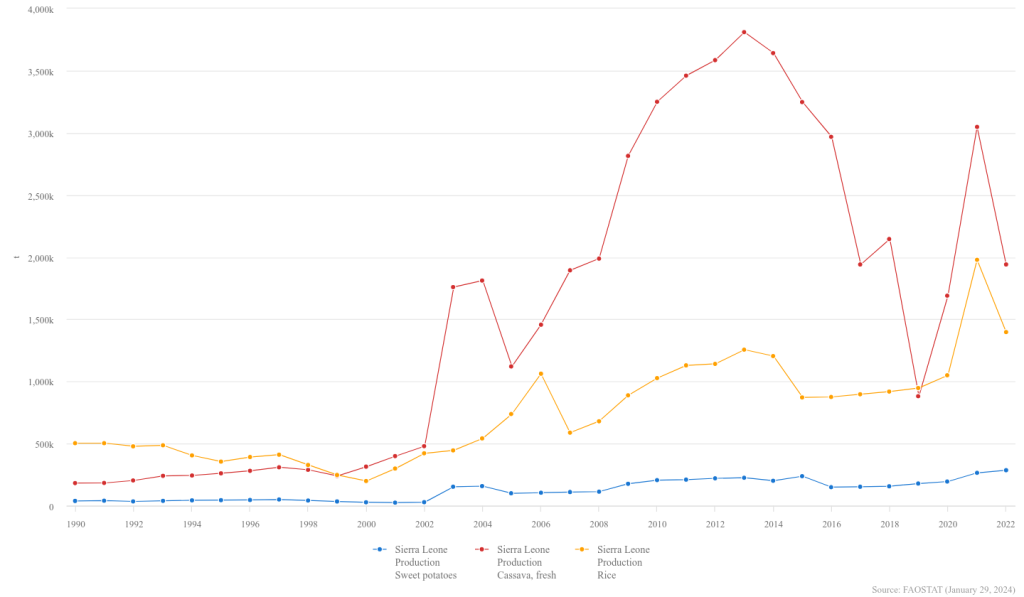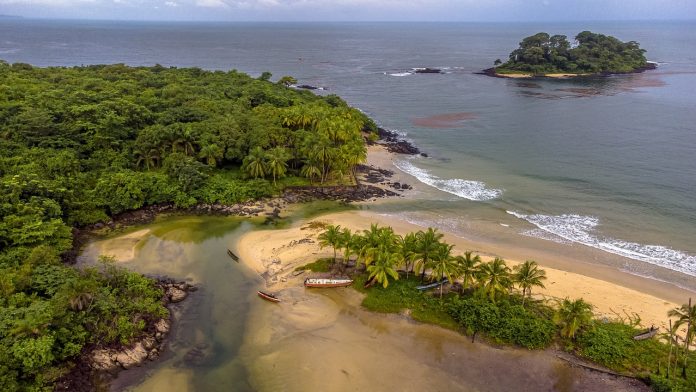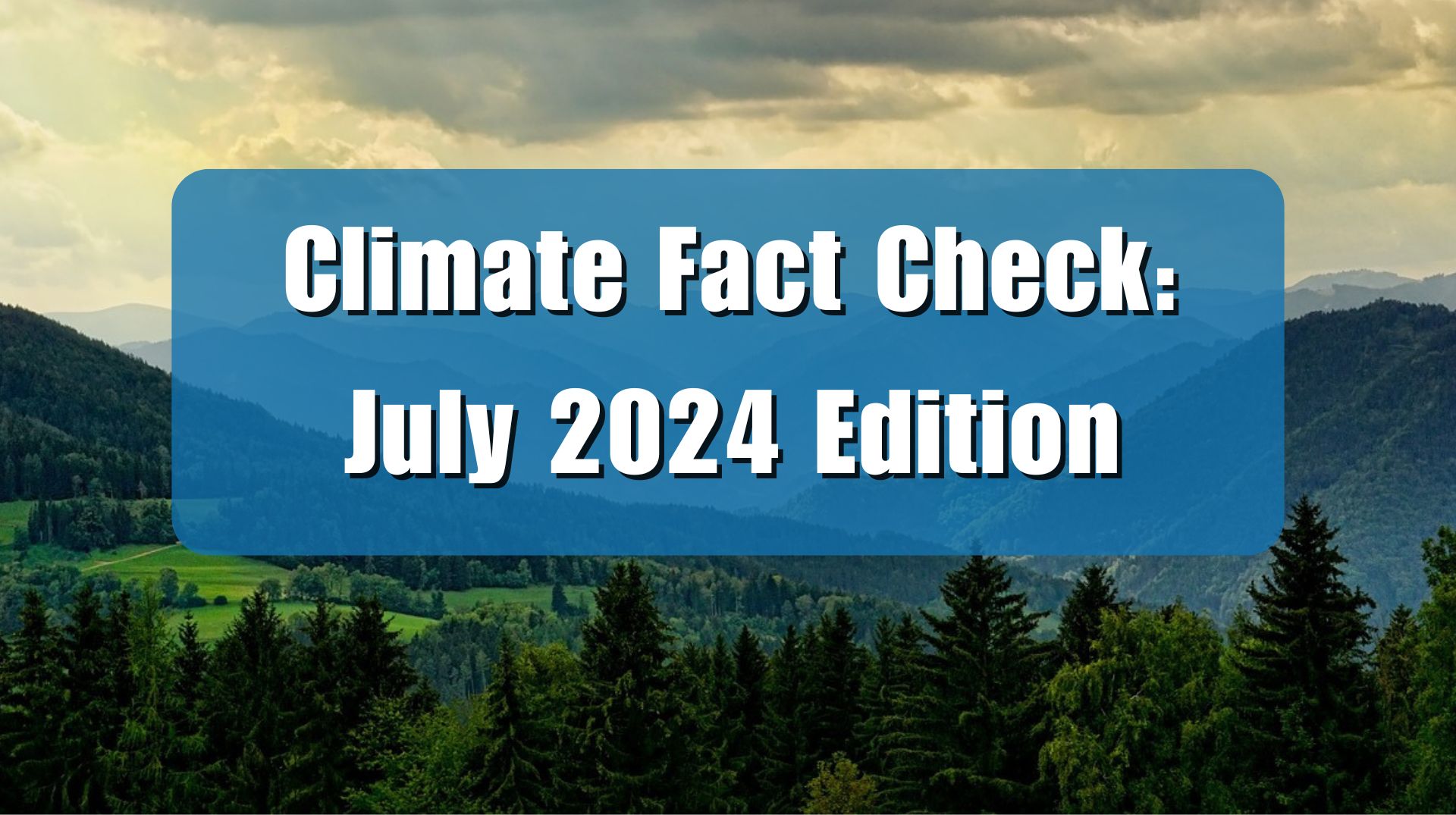A recent article at Al Jazeera titled “In Sierra Leone, climate change worsens human trafficking of the poor,” claims that human trafficking is exacerbated by alleged impacts of climate change like flooding and crop failures. Data, however, indicate that sea level rise and meteorological (weather-related) flooding is not getting worse in any way that can explain the capital of Sierra Leone’s flood problems. In addition, that the erratic nature of of major food crops seem to line up with civil strife more than climate change.
The vast majority of the Al Jazeera story is about human trafficking, how desperate people are tricked into being trafficked, and the suffering that traffickers inflict on vulnerable people. There is one short section that nods to climate change, arguing that it exacerbates the problem by destroying homes with flooding and mudslides, and “unpredictable rainfall” causing bad harvests of crops and forcing farmers to move into overcrowded cities.
Al Jazeera writer, Olivia Acland, writes that Sierra Leone is among the top 10 percent of countries listed as being vulnerable to climate change, giving no source for that figure, and explains that a third of the population lives in coastal regions where homes are more vulnerable to “worsening floods.” Acland goes on to claim some islands are “going underwater,” and “[e]ach year, flash floods tear through Freetown,” the country’s capital, killing residents. In 2021 and 2022 400 floods reportedly struck Freetown.
Acland implies that sea level rise is one of the reasons why the flooding is so severe, but data for the region is scarce. The nearest station in Africa is in Takoradi, Ghana, about 826 miles away as the crow flies, and sea level rise rates can change dramatically over much shorter distances, so these comparisons must be taken with a grain of salt. The Takoradi station data as published by the National Oceanic and Atmospheric Administration measures an average of about 3.32 mm/year of rise, which is in line or a little higher than estimated global averages.
Because the rate of sea level rise annually is so small it can’t account for repeated flooding. Local geographical conditions have driven flooding in recent years, not climate change. First, Freetown is located on a peninsula right off the river delta and estuary of the Rokel river, the largest in Sierra Leone. These kinds of locations, as discussed in previous Climate Realism posts (here, here, and here) are notorious for flooding and land instability. River deltas and estuaries are very dynamic by nature, and when human development comes in and more impermeable surfaces like roads and concrete are built, water has nowhere to go but to flood the city.
Weather data for Sierra Leone does not indicate that recent decades have seen more rainfall than previous, so that isn’t a legitimate part of the equation either.
What is not noted by the article is that the killer mudslides from 2017 were due to the combination of heavy downpours and unregulated construction and development which destabilized the sides of Sugarloaf mountain and caused large portions of it to slide off onto the villages below. Other stories about the deadly mudslides acknowledge that deforestation on the mountains has reduced their natural erosion control and makes mudslides more likely when heavy downpours occur. It is likely that these conditions also contributed to more recent mudslides.
Nor does crop production data on main staple crops for Sierra Leone (cassava, sweet potatoes, and rice) show a climate signal. While Cassava has seen some pretty severe fluctuations, these do not often coincide directly with weather events, but more strongly with civil unrest or the end of major periods of civil unrest. For example, looking at the production data in Figure 1 below, Cassava production massively took off in 2002. That year happens to be the very year that was the official declared end of a bloody civil war which lasted from 1991 until the end of 2001.

In 2014 through 2016, Sierra Leone suffered through an Ebola epidemic.
Despite the volatility, production of each of Sierra Leone’s staple crops have increased substantially since 1990:
- Cassava production rose 964%;
- Sweet potato production rose 637%;
- Rice production rose 177%.
Crop yields have increased at equally dramatic rates.
Other demographic indicators suggest that life in Sierra Leone, is improving, even as many remain poor. Sierra Leone’s average annual GDP growth rate in recent years has topped 4 percent annually. Also, health indicators, including infant mortality and life expectancy, have improved dramatically in recent decades. Infant mortality is still high and life expectancy is low compared to many countries, but the trends are improving.
Poverty and desperation certainly can drive people into the hands of traffickers, but all of the above facts combined suggest that if human trafficking is indeed becoming a larger problem in Sierra Leone, it is not due to or worsened by climate change.
If activists and organizations devoted to ending trafficking try to shift the blame on climate change, they will not solve the problem. In fact, it comes across as providing cover for the corrupt governments and groups that facilitate trafficking, or as a cynical effort to gain climate-related funding for anti-trafficking campaigns. Acland admits in the Al Jazeera piece that even though Sierra Leone has harsh sentences for traffickers, and dozens have been arrested, only three have been convicted, because they “often bribe their way out of jail or call on political contacts to pull strings.”
Fighting human trafficking is a truly worthy cause, but climate change is not responsible for any uptick in Sierra Leone. It appears that poor infrastructure planning, which leads to the loss of homes and businesses when bad weather hits, and local corruption, are the real culprits. Al Jazeera should be pointing the finger there instead of trying to tie peoples’ suffering to climate change, which cannot be directly addressed the way infrastructure and corruption can.

















Easy to blame some intangible factor that can’t be affected but the real culprits corruption and bad governance are swept under the rug! Pathetic that Al Jazerra resorts to the same nonsense that the climate alarmists use for causing every single issue.